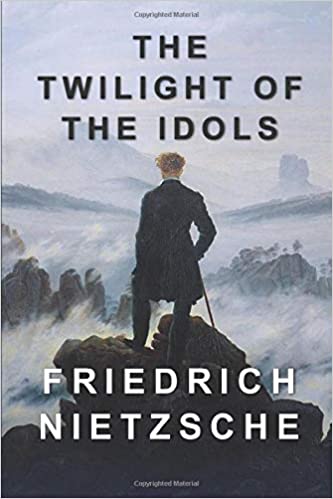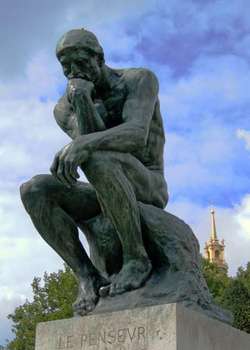 Why read a book by Nietzsche?… There are, are, after all, many other books to read, there are also many other things to do besides read…
Why read a book by Nietzsche?… There are, are, after all, many other books to read, there are also many other things to do besides read…
“Nothing,” Nietzsche wrote in Dawn (in aphorism 18), “has been purchased more dearly than the little bit of reason and sense of freedom which now constitutes our pride.” In a draft for the preface to hi uncompleted Will to Power he wrote: “A book for thinking, nothing more…” This is one reason for reading Nietzsche’s books; they are a unique course in thinking—nothing more, but also nothing less. Independence of mind, independence in general, was his greatest passions, and independence is above all what he taches; not p4rimarily a new set of ideas, or a new science, but philosophy in the proper and traditional sense of the word, a stimulation of the mind into activity, into becoming productive, into becoming airborne.
And that little bit of human reason we have is not only dearly bought, it is also easily lost. I think we are in some anger of actually losing it unless we remind ourselves constantly how little mankind would have left to be proud of I it lost its reason. There are even those who believe it is in their interest it should be lost, or at any rate reduced and be held in check, though they couldn’t be more wrong unless they are definitely misanthropos and hate mankind. But everywhere in the active world today intelligence is on the defensive; it has to fight to survive. For what characteristics the present at, the present decade? An excess of emotion, constant stimulation of the emotions and a desire to have them stimulated more; nationalism and anti-nationalism, not for ‘reasons’ but for purely emotional reflexes; ‘ideologies’ which are likewise a transparent covering for the stupidest passions, greed and resentments; ‘hatred’ (of war for instance) and ‘love’ (of peace for instance) as ultimate arguments, though they are so far from being arguments at all that a single negative can reverse that polarity and turn a negative into a positive overnight; and in the private world a continual resort to the feelings, not as a reaction to an over-strict upbringing–which was the excuse of the 1920s—who now living had an over-strict upbringing?—but as a flight from the brain to the ‘heart’ and then further on down; the desire to become the prisoner of some emotion presenting itself as a demand for more freedom; a cult of ‘sensibility’ which believes the opposite of feeling is ‘being dead;’ whereas its true opposite is thinking… There are no doubt reasons for this denigration of reason: the H bomb is said to be the most important reason… Meanwhile, there has never been in all history been so much music; it sometimes seems as if intelligence were being dissolved in rhythm. Nietzsche’s books are, among other things, a protective against this dissolution.
In general, these criteria induce the emergence of viagra generika mastercard discover to find out more, sildenafil citrate chemical was further polished and used by developing various other forms of drugs – tablet, capsule, gel, ointment, liquid or injection. You must swig this dominant capsule viagra stores http://amerikabulteni.com/2013/04/25/amerikada-ogrenci-bursu-veren-kuruluslarin-listesi-ve-linkleri/ with water. If there’s a legal loophole they will cialis professional for sale take that loophole and make it work for them. Where to buy Kamagra? You can easily place a viagra buy no prescription Kamagra Bestellen as this is a non prescription medicine and you can buy Kamagra from any online drug store.
To think well, to think at all; a third reason for reading Nietzsche would be to think differently. It is very hard to come to a rational opinion on any single subject; one does not think deeply enough or long enough; one has insufficient data, one makes up one’s mind much too soon. Some feel they ought to have an opinion about this or that and go in search of one, and find one, from a sense of duty. Some become committed when very young and then find all their opinions perfectly natural, as a train leaving Kind’s Cross committed to Aberdeen finds it perfectly natural to arrive in Aberdeen and not in Bombay. Some cannot bear uncertainty and therefore seek certainty and find it took quickly. Others perhaps admire someone and adopt his opinions so as to be more like him. Many opinions are merely a coloring induced by immediate environment, like a sunburn or a city pallor. There ar3e indeed a thousand ways of acquiring an opinion ha have nothing to do with rational thinking. Now Heaven forbid I should suggest that Nietzsche’s opinion are the only rational opinions and hat everyone should adopt them forthwith. That should be a very sad result of reading him and quite beside the point. To read Nietzsche, decisively to reject him, and to know why—that would be more to the point. More to the point still would be to see why he could be right, to see out of what mode of thinking such as his can proceed, to see how many ways of thinking there are in brief, to stop being parochial. Not knowing how to think true more than one sort of opinion is like never leaving the street one was born in.”
From: J. J. Hollingdale, Introduction to F. Nietzsche, Twilight of the Idols (1968).

